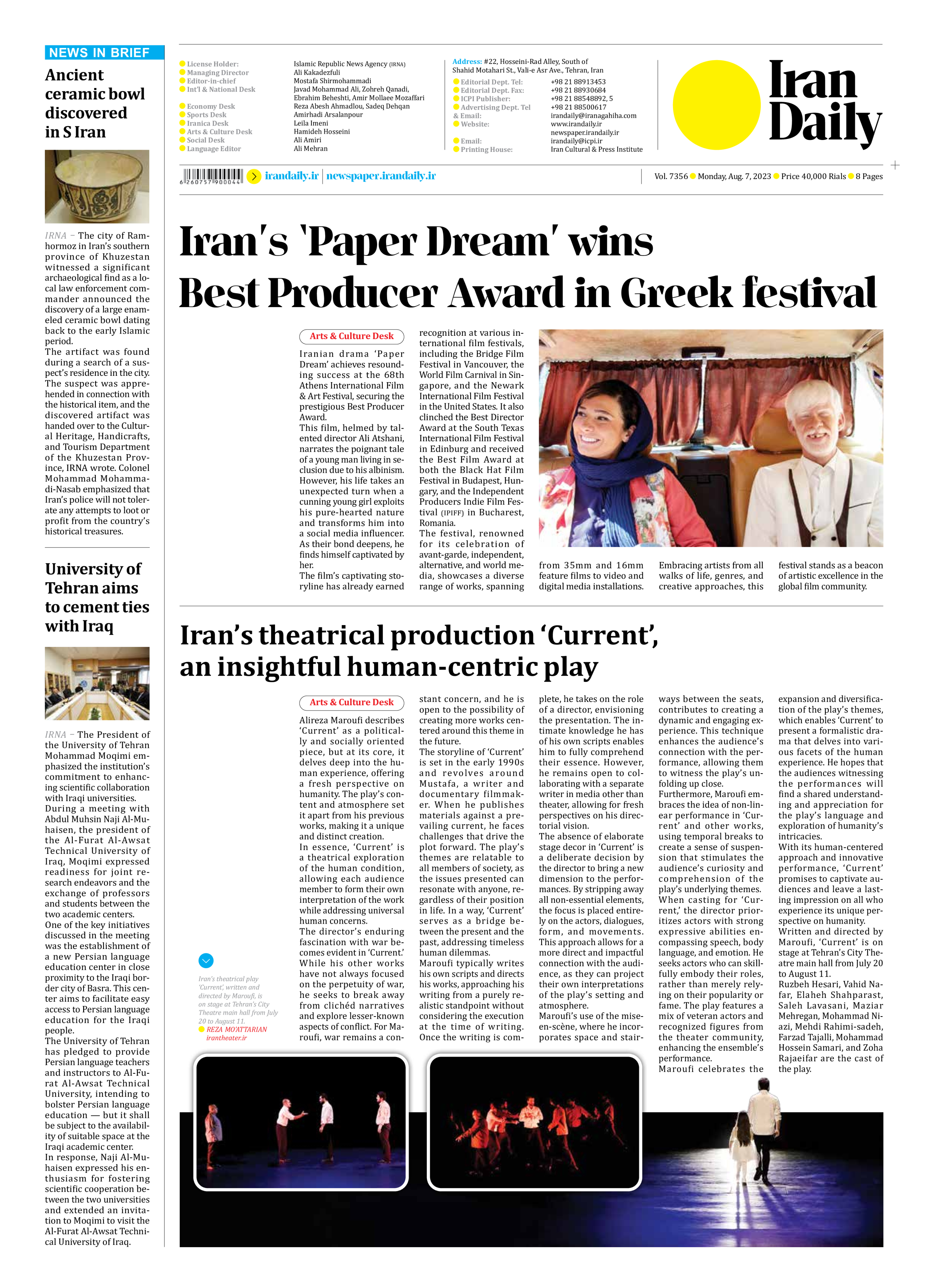
Iran’s theatrical production ‘Current’, an insightful human-centric play
Alireza Maroufi describes ‘Current’ as a politically and socially oriented piece, but at its core, it delves deep into the human experience, offering a fresh perspective on humanity. The play’s content and atmosphere set it apart from his previous works, making it a unique and distinct creation.
In essence, ‘Current’ is a theatrical exploration of the human condition, allowing each audience member to form their own interpretation of the work while addressing universal human concerns.
The director’s enduring fascination with war becomes evident in ‘Current.’ While his other works have not always focused on the perpetuity of war, he seeks to break away from clichéd narratives and explore lesser-known aspects of conflict. For Maroufi, war remains a constant concern, and he is open to the possibility of creating more works centered around this theme in the future.
The storyline of ‘Current’ is set in the early 1990s and revolves around Mustafa, a writer and documentary filmmaker. When he publishes materials against a prevailing current, he faces challenges that drive the plot forward. The play’s themes are relatable to all members of society, as the issues presented can resonate with anyone, regardless of their position in life. In a way, ‘Current’ serves as a bridge between the present and the past, addressing timeless human dilemmas.
Maroufi typically writes his own scripts and directs his works, approaching his writing from a purely realistic standpoint without considering the execution at the time of writing. Once the writing is complete, he takes on the role of a director, envisioning the presentation. The intimate knowledge he has of his own scripts enables him to fully comprehend their essence. However, he remains open to collaborating with a separate writer in media other than theater, allowing for fresh perspectives on his directorial vision.
The absence of elaborate stage decor in ‘Current’ is a deliberate decision by the director to bring a new dimension to the performances. By stripping away all non-essential elements, the focus is placed entirely on the actors, dialogues, form, and movements. This approach allows for a more direct and impactful connection with the audience, as they can project their own interpretations of the play’s setting and atmosphere.
Maroufi’s use of the mise-en-scène, where he incorporates space and stairways between the seats, contributes to creating a dynamic and engaging experience. This technique enhances the audience’s connection with the performance, allowing them to witness the play’s unfolding up close.
Furthermore, Maroufi embraces the idea of non-linear performance in ‘Current’ and other works, using temporal breaks to create a sense of suspension that stimulates the audience’s curiosity and comprehension of the play’s underlying themes.
When casting for ‘Current,’ the director prioritizes actors with strong expressive abilities encompassing speech, body language, and emotion. He seeks actors who can skillfully embody their roles, rather than merely relying on their popularity or fame. The play features a mix of veteran actors and recognized figures from the theater community, enhancing the ensemble’s performance.
Maroufi celebrates the expansion and diversification of the play’s themes, which enables ‘Current’ to present a formalistic drama that delves into various facets of the human experience. He hopes that the audiences witnessing the performances will find a shared understanding and appreciation for the play’s language and exploration of humanity’s intricacies.
With its human-centered approach and innovative performance, ‘Current’ promises to captivate audiences and leave a lasting impression on all who experience its unique perspective on humanity.
Written and directed by Maroufi, ‘Current’ is on stage at Tehran’s City Theatre main hall from July 20 to August 11.
Ruzbeh Hesari, Vahid Nafar, Elaheh Shahparast, Saleh Lavasani, Maziar Mehregan, Mohammad Niazi, Mehdi Rahimi-sadeh, Farzad Tajalli, Mohammad Hossein Samari, and Zoha Rajaeifar are the cast of the play.







